#Natasha Bagration
Text
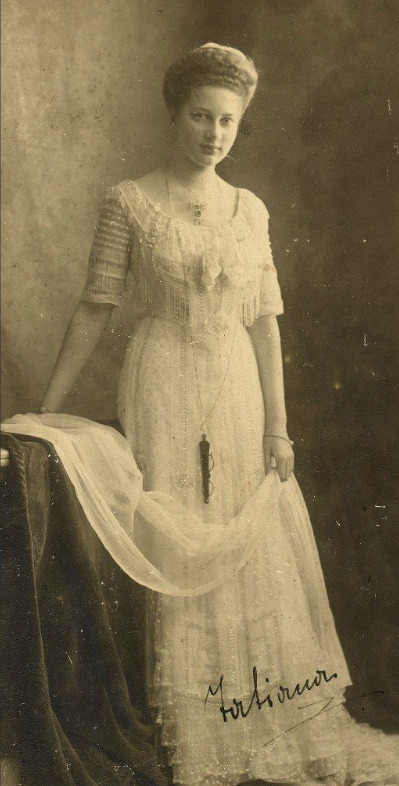
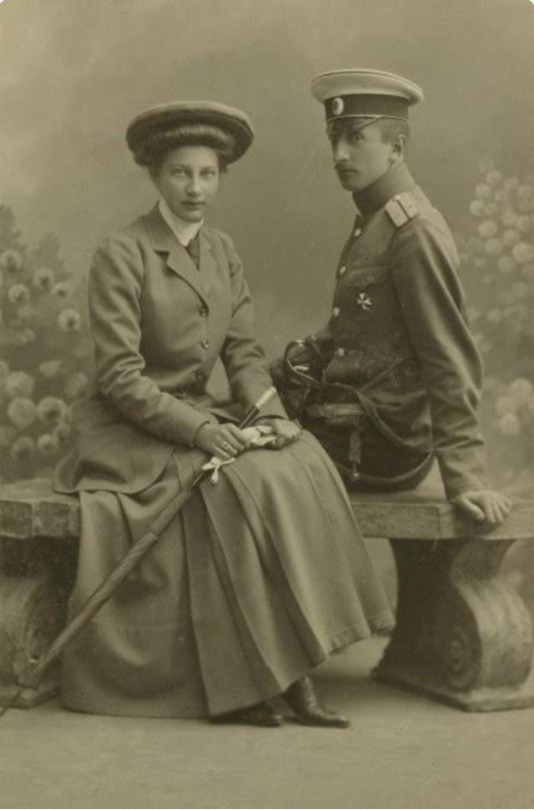
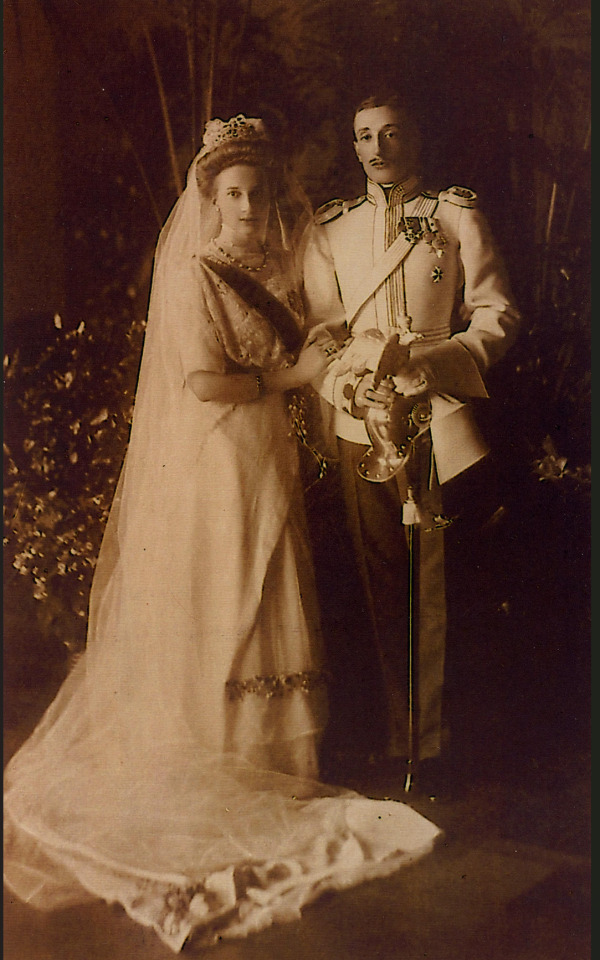
Above is a picture of beautiful Princess Tatiana Konstantinovna, followed by two photographs of her and her betrothed and later husband, the Georgian Prince Konstantine Bagration of Mukhrani
Below, is Tatiana in 1915, and Tatiana with her beautiful baby boy Teymuraz. On the group picture, she appears with her sister Vera and her adult son and daughter Teymuraz and Natalia.
The last picture depicts Tatiana as Mother Tamara, Abess of the Mount of Olives Convent in Jerusalem.
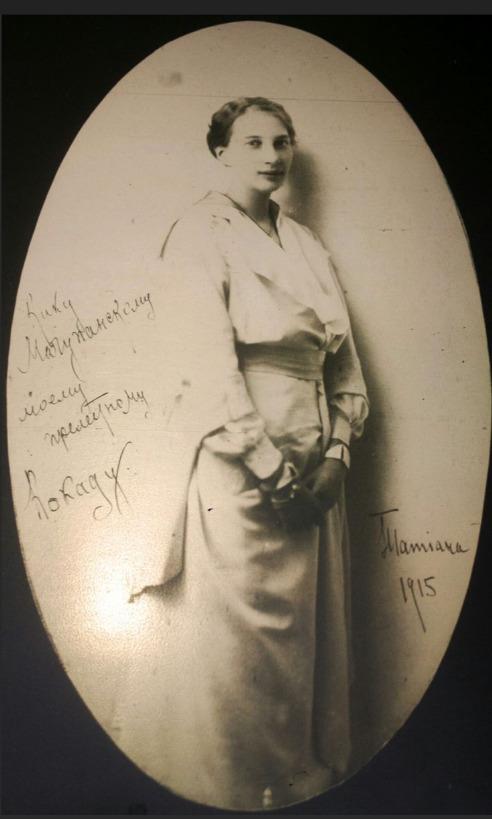
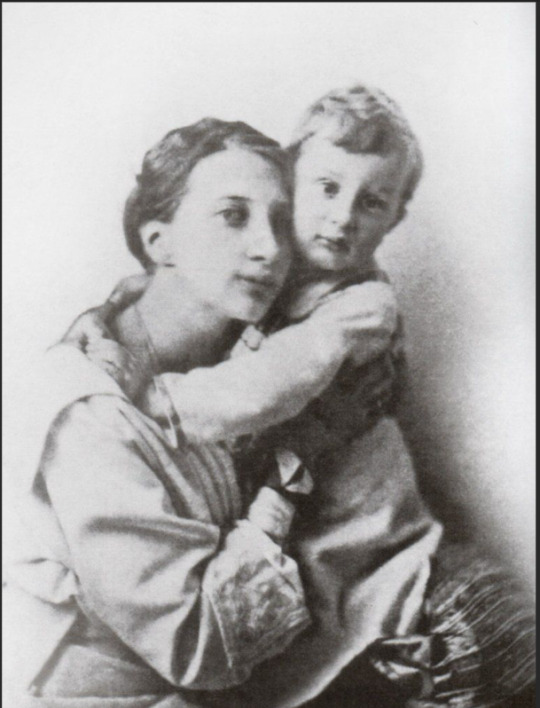

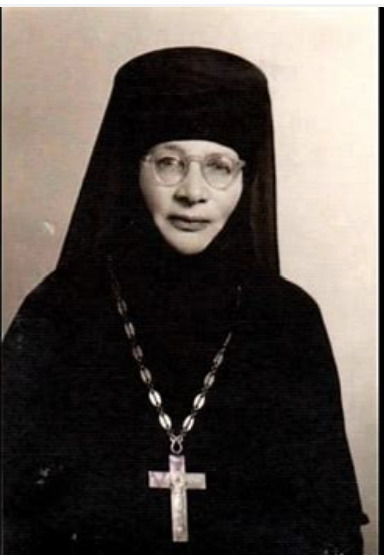
The Last Princesses of Imperial Russia
Princess Tatiana Konstantinovna: Third child, first daughter of Grand Duke Konstantin Konstantinovich and Grand Duchess Elizabeta Mavrikievna
When I look at pictures of Princess Tatiana Konstantinovna, I can imagine her at court functions with the Grand Duchesses Olga, Tatiana, Maria, and Anastasia...at balls, each other's weddings, and the baptism of each other's children. They were the next generation of the Imperial Family. But their fates took horrific detours. At least Princess Tatiana Konstantinovna survived.
Tatiana fell in love with and married Prince Konstantine Bagration of Mukhrani. Her father initially did not approve of the match but eventually consented. There are discussions about whether this marriage is morganatic or not, but we will not get into that here. The union went through with the Tzar's consent.
Tatiana and her bridegroom had two children: Teymuraz Bagration (1912 - 1992) and Natasha Bagration (1914-1984). Tatiana's wedded bliss did not last long...her husband died at war in 1914. She had already lost her brother Oleg at the beginning of the war. Her father died of natural causes shortly after the death of his son-in-law. Her uncle Grand Duke Dmitri Konstantinovich, would be executed by the Bolsheviks. Her brothers John, Constantine, and Igor would also be murdered.
After the death of Prince Bagration, Natalia fell in love with the aide de camp to her uncle Grand Duke Dmitri Konstantinovich. Her uncle encouraged her to leave Russia with him. She married Alexander Vassilievich Korochenzov in exile, but he died three months after the wedding. Although Tatiana reunited with her mother and two younger siblings (Vera and George), she basically raised her children alone.
In 1946, after her children were grown and married, she took the veil (this was a dream her father had for her.) She entered the Mount of Olives Convent in Jerusalem (after serving at another convent.) She died as Abess Mother Tamara (named so after the medieval Georgian queen Tamar, a remote ancestor of Tatiana's first husband) on 28 August 1979.
#Princess Tatiana Konstantinovna#Prince Konstantine Bagration of Mukhrani#Grand Duke Dmitry Konstantinovich#Grand Duke Konstantin Konstantinovich#Taymuraz Bagration#Natasha Bagration#Romanov Dynasty#Romanov family#Imperial Russia#Russian history#vintage photographs
12 notes
·
View notes
Text
War and Peace 140/198 -Leo Tolstoy
131
On the field between Borodino and the fortifications is where the principle action took place, the smoke hit him, the cannons and muskets concealed the armies in the ravine. They could be heard but impossible to know what the men were doing. Reports were false and contradictory, and orders were partially or not carried out.
132
Napoleon’s Generals Davoust, Ney and Murat, found the troops disorderly and panic-stricken, (are they the ones that didn’t make it past basic training) Napoleon refused to send reinforcements, but in the end sent Friat’s division. (thought you were a brilliant tactician) The delay was unfortunate, Napoleon felt it everything was the same as previous battles he won but this time no victory, all around reports of generals killed and requests of reinforcements, the troops were demoralized. Napoleon saw the sources of capturing the fortifications was different, it was almost a defeat. Napoleon rode over Semenovskoye and could see the Russians, the battle was a butchery, he could not direct this show, “for the first time, because of its failure, appeared to him as pointless and horrible.”p.470 (~War What Is It Good For~)
133
Kutuzof gave no definite orders apparently not interested in the reports only the faces and tones they were delivered in, (are you serious pay attention to the front line news not if the messenger has a resting bitch face) he knew it was impossible to command a hundred thousand men, (not if they are actually trained and organized) but it was all determined by the spirit of the army. The fortifications were retaken but Bagration was wounded, Murat taken prisoner, Kutuzof told him to postpone celebrating, the French now captured the fortifications and Semeovskoye but not pushed beyond Borodino. It was decided the battle was lost but Kutuzof wanted to attack the next day to drive the French from Russia.
134
Adrei’s regiment was among the reserves and lost two thirds of its effectiveness, Andrei had nothing to do as dead and wounded were taken away and tried to blind himself from the horrors. He and others flung themselves on the ground as the artillery shells flew. “I cannot, I will not die; I love life, I love this grass, the earth, the air...”p.475 (you know people who failed at suicide say that after they made the choice and were dying suddenly all their problems seem easily solvable) Andrei was struck in the side and was bleeding, he was carried to the field hospital. A wounded soldier was rambling and they listened, how if only the reserves were sent, but what indifference is it to him, now why does he regret leaving life. “There was in this life something I have not understood, and which I still fail to understand.”p.477
135
Andrei was carried into a tent, he was in too much agony to observe all around him, on one table a tartar was being held down as a surgeon cut into his back, (they didn’t have anesthesia back the only way to limit pain was either get pissing drunk or get the surgery done as quickly as possible) the man on the second table seemed familiar. As they started on Andrei, he lost consciousness and came too with his wounds dressed, he was taken back to his early childhood of his old nurse dressing him for bed. Hearing others groans he felt like crying for being torn from life, dying without fame, his memories or sympathy for others suffering. (so now while dying you want to live) The second man was Anatol Kurigan, who sobbed for his amputated leg, Andrei remembered Natasha and he pities Anatol (can’t say I pity him) and understands Maria’s preachings of love for brothers and enemies. “that is what made me feel regret for life; that is what would have remained for me if my life had been spared. But now it’s too late, I know it.”p.479
136
Tens of thousands were dead in the fields the peasants harvested for crops and cattle, thousands wounded, thousands hungry moved to the front, as the rain fell it seemed to say enough. Either side the men began to question and wanted no more of it and at any moment may give it up. Still some power seemed to direct them. “and still that strange affair went on which was accomplished, not by the will of men, but by the will of Him who rules men and worlds.”p.480 Neither side made the last effort to win, so the conflict slowly died out. Napoleon did not send his Guard because it was impossible with the dejected spirit of the army, their moral was exhausted. The Russians still stood despite losing half the troops, “Victory is not something signalized by the fastening of certain strips of cloth called flags to poles, nor by the space on which troops have stood or are standing; victory is moral.”p.481 The French went to Moscow but doomed to perish from the moral wound at Borodino, the ruin of Napoleonic France.
PART ELEVENTH
137
1812, the war between France and Russia was a signal for French satellites to rise up. Prussia prepared to take up the British and Russian sides, Austria is openly hostile waiting to enter the war. Napoleon was to conquer or lose all, believing the key is Russia and takes Moscow.
The Russians retreated eighty miles, the French stepped in Moscow, there was a five-week standstill then the French retreated, Kutuzof believed they won Borodino. Kutuzof gave orders to prepare for battle as reports of losses came in reduced by half, battle became impossible. On September 16 the French neared Moscow and was surrendered to it, Kutuzof couldn't comprehend to retire beyond Moscow without battle. The generals discussed what to do in different groups, Kutuzof wondering if he allowed Napoleon to reach Moscow and when did he do it, now he must give the order to abandon the city. He loved power and was convinced he could save Russia; it was the reason he was put in command, now he was overwhelmed by it.
They convened at a council at a peasant’s household, (the meeting was observed by a little girl would not fly today) they waited hours for Benigsen to arrive. When he did, he opened with a question, if they should desert Moscow with or without fighting, Kutuzof says salvation is the army, risk it and Moscow’s loss, by accepting battle or losing. Opinions were divided, discussions of pros and cons, but Moscow was already abandoned by the events. Kutuzof relents and commands they retreat, the generals left like a funeral procession while Kutuzof said to himself it’s not over and they will eat horseflesh like the Turks.
138
Helene just returned to Petersburg and found herself in a delicate situation, she enjoyed the protection of a grandee in Petersburg but in Vilna she was intimate with a prince, (so she’s triple timing) now with both in town she had to preserve both relationships without offending either. Taking her (undeserved) reputation of a clever woman, she didn't sneak around and believed she was in the right and everyone else was wrong. (so she’s a narcissist) She told the prince she is only accountable to God and her conscience (what conscience) and wants him to marry her despite his hesitancies with law and religion. A few days later Helene had a party, a guest was a Jesuit and she listened to his talk of religion and she converted to Catholicism. She wore white and men lavished her with attention, but this didn't stop her ambitions, she asked her religious guide how bound was she to her marriage. Her vows bind her but she doesn't think she can be bound by what was imposed on her by a false religion, he began to refute her reasonings.
139
Helene thought the matter simple but her spiritual directors held out because of how it might strike temporal powers. (if you’re not following she converted to Catholicism so she can give money to Catholic powers to divorce Pierre but they won’t annul her marriage) She thought society should be prepared for the eventuality and told her grandee what she told her prince, he was hesitant too but with innocence (yeah right) she told all her friends the two proposed, but she was afraid of choosing since she loved them both (yeah right) and rumors spread that Helene desired a divorce. Now it wasn't what was permissible, but who was the most desirable and how the court looked at it. Marya Dmitrievna Akhrasimova called out Helene (about time someone did) on marrying again while her husband was still alive, she may think she’s doing something now, but the brothels do it all the time. (oh snap) While Marya was feared she was also seen as a joke, so she was ignored. Vasili told her to consult her own heart and Bilibin, (I keep reading his name as Bilbo) who lost his reputation of a clever man, told Helene his views and will her husband consent, Pierre loves her and will do anything for her. (you really don’t know your husband at all) Her mother objected to it but Helene dismissed her concerns, her mother decides she’s right, all sins are forgiven and thinks if only she knew of this when she was young. (I see Helene got it from both her parents) By August Helene decided and wrote to Pierre she wanted a divorce, it was delivered to his house when he was in Borodino.
140
September 10, Pierre arrived in Moscow and is immediately called to Count Rostopchin, the home was filled with young and old military and civilian officials ill at ease. The new placard declares they will shed every drop of blood in defense of Moscow, (~Moscow Will Never Give In There Is No Surrender~) Pierre says he was told it was impossible to fight in the city, it is. (believe me it is possible to turn a city into a battleground) They change the subject to Pierre’s domestic troubles, he knows nothing of it and demands to know and is just told his wife plans to go abroad, it’s all nonsense of course those rumors. Pierre sees Vereshchagin, months ago a proclamation was traced back to him and the count flew into a rage, the son was convicted and now the father is here to intercede.
Before another anecdote Pierre was summoned to the count’s room and is asked if he’s a Mason and is told he is ignorant of how they are trying to ruin Russia and advises Pierre to cut ties with them, but doesn't tell him what Kliucharef is guilty of. (like a son to me relationship he can tell Pierre is young and dumb) Pierre says he circulated Napoleon’s proclamation, Rostopchin says Vereshchagin is also a traitor and received the punishment he deserves. He advises Pierre to cut ties and leave town, this is the eve of public disaster and when asked Pierre makes no reply on Helene falling in with the Jesuits but leaves angry. At home he ignored those that wanted to speak to him about business and opened Helene’s letter. The next morning a police officer was sent by Rostopchin to check if Pierre was leaving, he avoided the dozens in the drawing room wanting to discuss business and snuck out the back. Despite searching, none in his house knew where or what became of Pierre until after Moscow burned. (he ran away from home)
NEXT
1 note
·
View note
Photo

Princess Natalia Bagration of Mukhrani (19 April 1914 – 26 August 1984), was a Georgian noblewoman of the House of Mukhrani.
Princess Natalia was born in Pavlovsk Palace on 19 April 1914 and was a daughter of Prince Constantine Bagration of Mukhrani and Princess Tatiana Constantinovna of Russia. Princess Natasha was born into two prominent royal dynasties, the Georgian Bagrationi dynasty and the Russian House of Romanov. At her christening, her godfather was Emperor Nicholas II and his daughter Grand Duchess Olga. Due to her ancestry, she was related to British royal family, being second cousin of Prince Philip, Duke of Edinburgh, second cousin of Princess Marina, Duchess of Kent, and fourth cousin of Queen Elizabeth II.
After the Russian revolution, she and her family went to live in Yugoslavia. According to memoirs of Prince Tomislav of Yugoslavia, she was his first childhood crush.
While working in London for the Yugoslav government-in-exile she met and later married British diplomat Sir Charles Johnston on 24 April 1945. Upon his being knighted in 1959, she became formally styled Lady Johnston. They had no children.
She died on 26 August 1984 in London and was buried there at Gunnersbury Cemetery. She had a brother Prince Teymuraz Bagration-Mukhransky who lived in the United States.
22 notes
·
View notes
Text
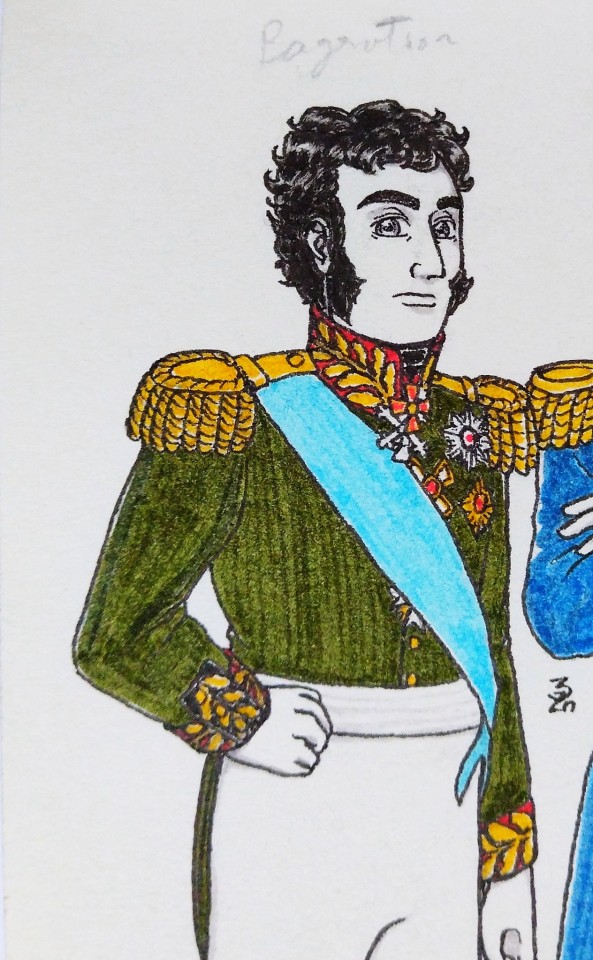
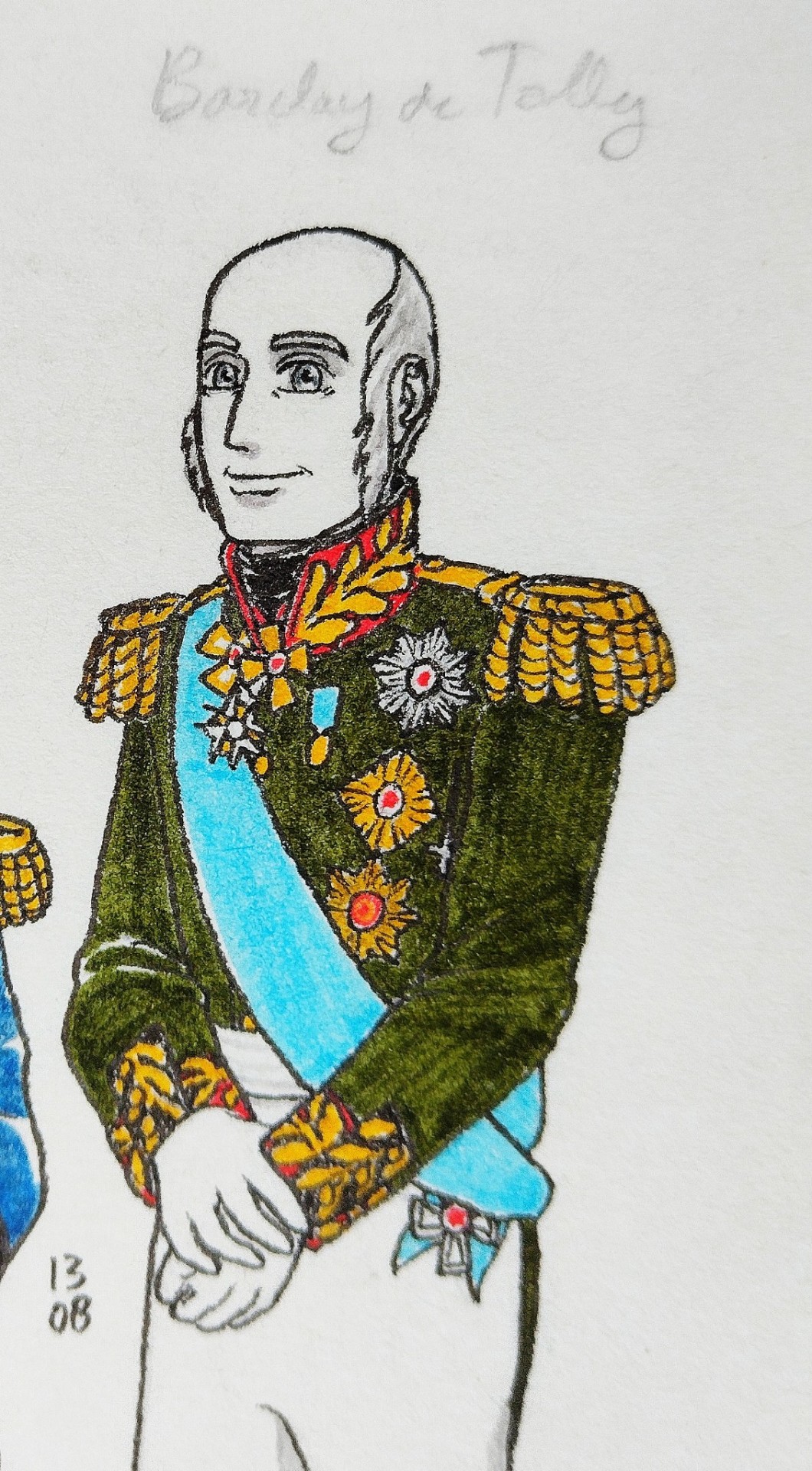
🔥 Hellblazer Generals 🔥 spotlight — Bagration, Barclay de Tolly
.
...so maybe you wonder, how did I learn about these two generals? Well, it all started when I first read a collection of short stories for children written by none other than...Leo Tolstoy!
(...yup. My great-grand uncle gifted that book for my 11th birthday — the stories were written by Tolstoy with the intention to provide the children of ex-serfs on his estate with reading material for their schooling). I read all the stories once I opened the gift and just like that, I was pulled in — hook, line and sinker. His writing style was (...still is really 😉) highly engaging to me, and learning from the afterword in that book I learned about Tolstoy's two novels — War and Peace and Anna Karenina. From that point on I decided that once I am old enough (this was back when I was on 5th grade in elementary school 😛) I am going to read one of the (if not both) novels.
Anyway, fast forward to college time, when I finally laid my hand on War and Peace.
Judging just from its title you can definitely guess that the story is going to be epic (😅), what I didn't guess though was what war the novel was talking about — and it didn't cross my mind at all that the war in the novel was the Napoleonic Wars (roughly from Austerlitz to Borodino). I was overwhelmed from the first pages but determined to plow through and boy I am glad I did! 😏😉. As I got to know Pierre, Andrey and Natasha I too got to know the Generals, Counts, Marshals and Emperors in the novel...
...and that's how I first heard of Bagration and Barclay de Tolly. It's been a long while since I read it so I am not so sure why among all of the other military men's names (on either Russian/French side), theirs were the ones that managed to stick on my mind (alongside Kutuzov on the Russian side — contrast that to the French side, other than Napoleon I unfortunately didn't remember reading about any of his marshals 😅😫🙈 I mean Ney was in the book but I didn't even remember reading about him??) — I think their names and story was mentioned/told often enough throughout the book 🤔 (and I definitely sensed their importance alongside Kutuzov's). Anyhow, onto the first impressions upon knowing their name...
Bagration's name...sounded interesting to me. On the first blush I kinda surmised that it didn't seem like an ordinary Russian family name (it is in fact, a Georgian name), but somehow it didn't feel...foreign to me? Maybe because it is easier to pronounce compared to some Russian names? 🤔. As for Barclay de Tolly, when I first read his name my initial reaction was, "...wait tHat's NOt a rUsSiAn nAMe!". And sure enough, when I checked his wikipedia page I found out that he was from a Lithuanian German noble family with roots from Scotland(!) (...whoa, talk about a cosmopolitan background...).
And that's how I found out about these two gentlemen 😏😉. Anyhow I am due for a reading about these two generals ...and a reread of W&P too (yea I know Tolstoy strayed a bit from the historical fact but I realized that from when I first read it that he wasn't going to be completely historically accurate with the historical retelling part... 🤔)
#drawing#original art#illustration#manga#pen and ink#traditional art#drawing pen#brush pen#fan art#napoleonic wars#napoleonic era#napoleonic#pyotr ivanovich bagration#pyotr bagration#петр иванович багратион#михаил богданович барклай де толли#michael barclay de tolly#michael andreas barclay de tolly#historical art
17 notes
·
View notes
Photo

1940 Princess Natasha (née Bagration-Mukhransky), Lady Johnston (photo by Bassano Ltd)
(National Portrait Gallery, London)
52 notes
·
View notes
Text
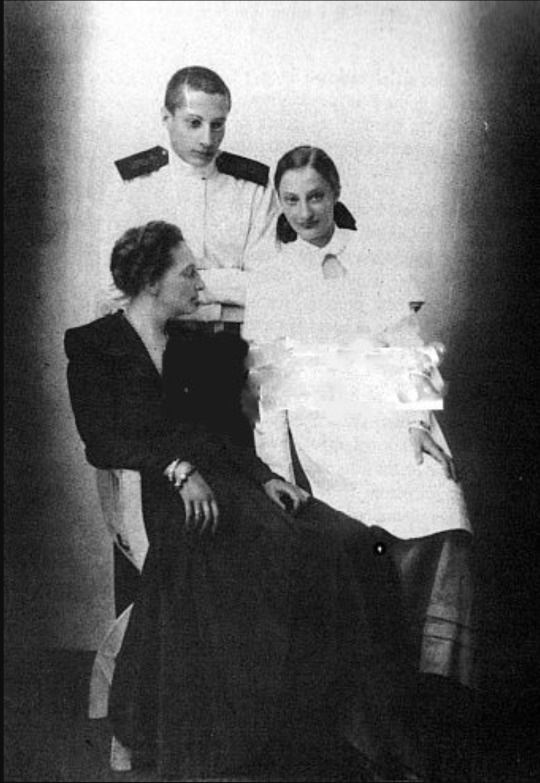
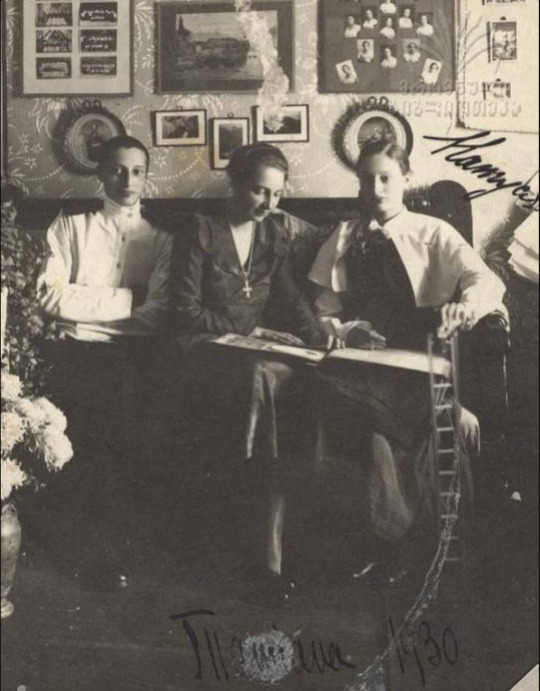

Photographs: 1. A very elegant Tatiana with her two children, Taymuraz and Natasha; 2. Tatiana looking at pictures with her children; 3. Tatiana and her sister Vera Konstantinovna
Princess Tatiana Konstantinovna of Russia (1890 – 1979)
Tatiana was the third child and oldest daughter of Grand Duke Konstantin Konstantinovich and his wife, Grand Duchess Elizabeth Mavrikievna. In 1911, she married the Georgian Prince Konstantine Bagration of Mukhrani.
Tatiana and Prince Konstantine Bagration had two children: Teymuraz Bagration (1912-1992) and Natasha Bagration (1914-1984). Unfortunately, Tatiana's husband died at the beginning of WWI. She went to live with her uncle, Grand Duke Dmitry Konstantinovich, who was almost blind and needed help. She was very close to him.
While living with her uncle she fell in love with one of his aids de camp, Alexander Korochenzov (1877 – 1922.) Urged by her uncle, she left Russia with Korochenzov and her young children. They were fortunate enough to escape, as her uncle Dmitri Konstantinovich was executed in St. Petersburg in January 1919.
Tatiana Konstantinovna and Korochenzov at first fled to Romania and later to Switzerland. They married in Geneva. Three months later, however, Tatiana became a widow for the second time when Alexander died in Lausanne.
Tatiana raised her children alone, and after both were grown and married, she took the veil. She died as Mother Tamara, Abbess of the Mount of Olives Convent in Jerusalem in February 1979.
Photographs: 1. A very elegant Tatiana with her two children, Taymuraz and Natasha; 2. Tatiana looking at pictures with her children; 3. Tatiana and her sister Vera Konstantinovna
#Russian history#romanov dynasty#Princess Tatiana Konstantinovna#Princess Vera Knostantinovna#Taymuraz Bragation#Natasha Bragation#Grand Duke Dmitry Konstantinovich#Alexander Korochenko
12 notes
·
View notes